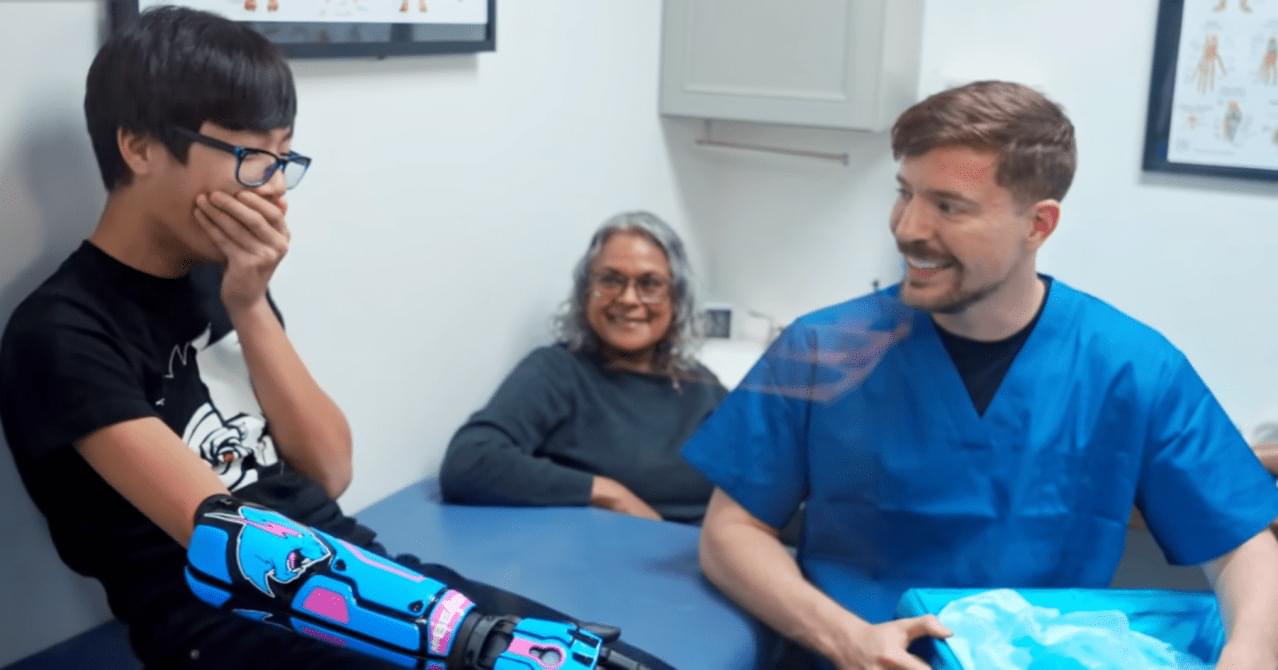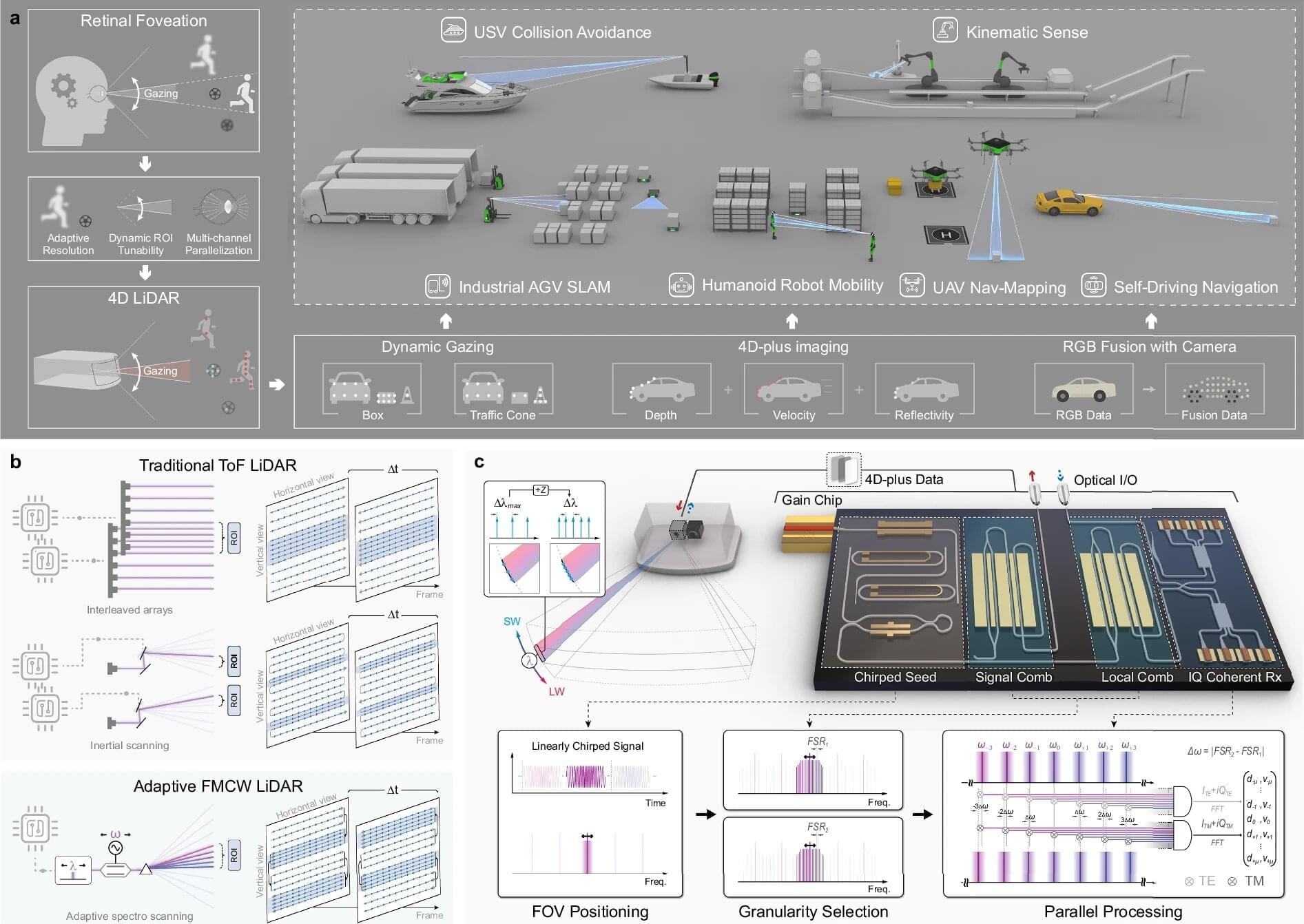Twelve‑year‑old Kai Pollnitz from Georgetown received a life‑changing surprise when YouTube creator MrBeast gifted him a custom Open Bionics Hero PRO robotic hand. Kai, who was born with a congenit…



In a recent study, researchers from China have developed a chip-scale LiDAR system that mimics the human eye’s foveation by dynamically concentrating high-resolution sensing on regions of interest (ROIs) while maintaining broad awareness across the full field of view.
The study is published in the journal Nature Communications.
LiDAR systems power machine vision in self-driving cars, drones, and robots by firing laser beams to map 3D scenes with millimeter precision. The eye packs its densest sensors in the fovea (sharp central vision spot) and shifts gaze to what’s important. By contrast, most LiDARs use rigid parallel beams or scans that spread uniform (often coarse) resolution everywhere. Boosting detail means adding more channels uniformly, which explodes costs, power, and complexity.
This video explores aliens, mind uploading to other species, genetic engineering, and future robots.
SOURCES:
• https://en.wikipedia.org/wiki/Eagle_eye#:~… https://www.scientificamerican.com/ar… • https://en.wikipedia.org/wiki/Human_c… ___ 💡 Future Business Tech explores the future of technology and the world. Examples of topics I cover include: • Artificial Intelligence & Robotics • Virtual and Augmented Reality • Brain-Computer Interfaces • Transhumanism • Genetic Engineering SUBSCRIBE: https://bit.ly/3geLDGO ___ This video explores the future of ChatGPT and 10 ways it could change society. Other related terms: aliens, alien species, advanced civilization, genetic engineering, robot, mind upload, mind uploading, brain computer interface, artificial intelligence, ai, future business tech, future technology, future technologies, etc. ℹ️ Some links are affiliate links. They cost you nothing extra but help support the channel so I can create more videos like this. #alien #aliens #avatar #avatar2 #geneticengineering #braincomputerinterface.
• https://vcahospitals.com/know-your-pe…
• https://www.scientificamerican.com/ar…
• https://en.wikipedia.org/wiki/Human_c…
💡 Future Business Tech explores the future of technology and the world.
Examples of topics I cover include:
• Artificial Intelligence & Robotics.
• Virtual and Augmented Reality.
• Brain-Computer Interfaces.
• Transhumanism.
• Genetic Engineering.
SUBSCRIBE: https://bit.ly/3geLDGO
This video explores the future of ChatGPT and 10 ways it could change society. Other related terms: aliens, alien species, advanced civilization, genetic engineering, robot, mind upload, mind uploading, brain computer interface, artificial intelligence, ai, future business tech, future technology, future technologies, etc.
Here’s my full 30-min interview from yesterday with Cenk Uygur on TYT! We cover a lot of things: superintelligence, Basic Income, my Automated Abundance Economy, and my California Governor run.
Cenk Uygur and Zoltan Istvan discuss the future of AI and California on The Young Turks. Do you agree with TYT’s take? Tell us what you think in the comments below. SUBSCRIBE today: ☞ https://go.tyt.com/ytsubscribe.
Get paid to use your phone less! Switch to Noble Mobile today: https://go.tyt.com/mobile.
CHAPTERS:
0:00 Zoltan Istvan on running as a Democrat.
0:45 Transhumanist party.
2:30 Zoltan on AI & technology.
9:50 No corporate or Israel lobby money.
10:20 Zoltan’s policy priorities.
11:40 Robots for every Californian?!
14:00 Universal basic income.
23:00 Taxing robots?!
25:50 Reaching across the aisle.
28:00 AI revolution.
🔥 Tired of corporate media? Get honest news and bold commentary with TYT.
Questions to inspire discussion.
🎯 Q: How should retail investors approach AI and robotics opportunities? A: Focus on technology leaders like Palantir, Tesla, and Nvidia that demonstrate innovation through speed of introducing revolutionary, scalable products rather than attempting venture capital strategies requiring $1M bets across 100 companies.
💼 Q: What venture capital strategy do elite firms use for AI investments? A: Elite VCs like A16Z (founded by Marc Andreessen) invest $1M each in 100 companies, expecting 1–10 to become trillion-dollar successes that make all other bets profitable.
🛡️ Q: Which defense sector companies are disrupting established contractors? A: Companies like Anduril are disrupting the five prime contractors by introducing innovative technologies like drones, which have become dominant in recent conflicts due to lack of innovation in the sector.
⚖️ Q: What mindset should investors maintain when evaluating AI opportunities? A: Be a judicious skeptic, balancing optimism with skepticism to avoid getting carried away by hype and marketing, which is undervalued but crucial for informed investment decisions.
Tesla’s Competitive Advantages.

Celebrating a 7-year anniversary of the first edition of my book The Syntellect Hypothesis (2019)! I can’t help but feel like I’m watching a long-launched probe finally begin to transmit back meaningful data. What started as a speculative framework—half philosophy, half systems theory—has aged into something uncannily timely, as if reality itself had been quietly reading the manuscript and taking notes. In those seven years, AI has gone from clever tool to cognitive co-actor, collective intelligence has accelerated from metaphor to measurable force, and the idea of a convergent, self-reflective Syntellect no longer feels like science fiction so much as a working hypothesis under active experimental validation.
Looking back, the book captured a moment just before the curve went vertical. Looking forward, it reads less like a prediction and more like an early cartography of a terrain we’re now actively inhabiting. The signal is stronger, the noise louder, and the questions sharper—but the core intuition remains intact: intelligence doesn’t merely grow, it integrates. And once it does, history stops being a line and starts behaving more like a phase transition.
Here’s what Google summarizes about the book: The Syntellect Hypothesis: Five Paradigms of the Mind’s Evolution by Alex M. Vikoulov is a book that explores the idea of a future phase transition where human consciousness merges with technology to form a global supermind, or “Syntellect”. It covers topics like digital physics, the technological singularity, consciousness, and the evolution of humanity, proposing that we are on the verge of becoming a single, self-aware superorganism. The book is structured around five paradigms: Noogenesis, Technoculture, the Cybernetic Singularity, Theogenesis, and Universal Mind.
Key Concepts.
Syntellect: A superorganism-level consciousness that emerges when the intellectual synergy of a complex system (like humanity and its technology) reaches a critical threshold. Phase Transition: The book posits that humanity is undergoing a metamorphosis from individual intellect to a collective, higher-order consciousness.
Five Paradigms: The book is divided into five parts that map out this evolutionary journey: Noogenesis: The emergence of mind through computational biology. Technoculture: The rise of human civilization and technology. The Cybernetic Singularity: The point of Syntellect emergence. Theogenesis: Transdimensional propagation and expansion. Universal Mind: The ultimate cosmic level of awareness.
Themes and Scope.

In the 21st century, new powerful technologies, such as different artificial intelligence (AI) agents, have become omnipresent and the center of public debate. With the increasing fear of AI agents replacing humans, there are discussions about whether individuals should strive to enhance themselves. For instance, the philosophical movement Transhumanism proposes the broad enhancement of human characteristics such as cognitive abilities, personality, and moral values (e.g., Grassie and Hansell 2011; Ranisch and Sorgner 2014). This enhancement should help humans to overcome their natural limitations and to keep up with powerful technologies that are increasingly present in today’s world (see Ranisch and Sorgner 2014). In the present article, we focus on one of the most frequently discussed forms of enhancement—the enhancement of human cognitive abilities.
Not only in science but also among the general population, cognitive enhancement, such as increasing one’s intelligence or working memory capacity, has been a frequently debated topic for many years (see Pauen 2019). Thus, a lot of psychological and neuroscientific research investigated different methods to increase cognitive abilities, but—so far—effective methods for cognitive enhancement are lacking (Jaušovec and Pahor 2017). Nevertheless, multiple different (and partly new) technologies that promise an enhancement of cognition are available to the general public. Transhumanists especially promote the application of brain stimulation techniques, smart drugs, or gene editing for cognitive enhancement (e.g., Bostrom and Sandberg 2009). Importantly, only little is known about the characteristics of individuals who would use such enhancement methods to improve their cognition. Thus, in the present study, we investigated different predictors of the acceptance of multiple widely-discussed enhancement methods. More specifically, we tested whether individuals’ psychometrically measured intelligence, self-estimated intelligence, implicit theories about intelligence, personality (Big Five and Dark Triad traits), and specific interests (science-fiction hobbyism) as well as values (purity norms) predict their acceptance of cognitive enhancement (i.e., whether they would use such methods to enhance their cognition).

Cars from companies like Tesla already promise hands-free driving, but recent crashes show that today’s self-driving systems can still struggle in risky, fast-changing situations.
Now, researchers say the next safety upgrade may come from an unexpected source: The brains of the people riding inside those cars.
In a new study appearing in Cyborg and Bionic Systems, Chinese researchers tested whether monitoring passengers’ brain activity could help self-driving systems make safer decisions in risky situations.
From cyborgs to hive minds and civilizations of pure thought, we trace the possible futures of our species through the next trillion tomorrows.
Checkout Scav: https://go.nebula.tv/scav?ref=isaacar… Watch my exclusive video Autonomous Space Industry: https://nebula.tv/videos/isaacarthur–… Nebula using my link for 40% off an annual subscription: https://go.nebula.tv/isaacarthur Grab one of our new SFIA mugs and make your morning coffee a little more futuristic — available now on our Fourthwall store! https://isaac-arthur-shop.fourthwall… Visit our Website: http://www.isaacarthur.net Join Nebula: https://go.nebula.tv/isaacarthur Support us on Patreon: / isaacarthur Support us on Subscribestar: https://www.subscribestar.com/isaac-a… Facebook Group:
/ 1,583,992,725,237,264 Reddit:
/ isaacarthur Twitter:
/ isaac_a_arthur on Twitter and RT our future content. SFIA Discord Server:
/ discord Credits: The First Interstellar Colony Humanity’s Leap Beyond Sol Written, Produced & Narrated by: Isaac Arthur Editor: Keith Oxenrider Select imagery/video supplied by Getty Images Music by Epidemic Sound: http://nebula.tv/epidemic & Stellardrone Chapters 0:00 Intro 0:15 The Road Ahead 2:24 What Do We Mean by “Human,” “Transhuman,” and “Posthuman”? 7:22 Life Extension – The Oldest Dream 10:33 Intelligence Beyond Biology – AI and Human Integration 14:19 Enhancing the Body and Mind 17:00 Civilizations of the Augmented 19:31 Scavenger Hunt 20:51 Strange Posthuman Pathways 23:11 Outward Migration – Stars and Timelines 25:00 Risks, Fears, and Pushback 26:27 Humanity on Cosmic Timescales 27:43 The Expanding Story.
Watch my exclusive video Autonomous Space Industry: https://nebula.tv/videos/isaacarthur–…
Get Nebula using my link for 40% off an annual subscription: https://go.nebula.tv/isaacarthur.
Grab one of our new SFIA mugs and make your morning coffee a little more futuristic — available now on our Fourthwall store! https://isaac-arthur-shop.fourthwall…
Visit our Website: http://www.isaacarthur.net.
Join Nebula: https://go.nebula.tv/isaacarthur.
Support us on Patreon: / isaacarthur.
Support us on Subscribestar: https://www.subscribestar.com/isaac-a…
Facebook Group: / 1583992725237264
Reddit: / isaacarthur.
Twitter: / isaac_a_arthur on Twitter and RT our future content.
SFIA Discord Server: / discord.
Credits:
The First Interstellar Colony Humanity’s Leap Beyond Sol.
Written, Produced & Narrated by: Isaac Arthur.
Editor: Keith Oxenrider.
Select imagery/video supplied by Getty Images.
Music by Epidemic Sound: http://nebula.tv/epidemic & Stellardrone.
Chapters.
0:00 Intro.
0:15 The Road Ahead.
2:24 What Do We Mean by “Human,” “Transhuman,” and “Posthuman”?
7:22 Life Extension – The Oldest Dream.
10:33 Intelligence Beyond Biology – AI and Human Integration.
14:19 Enhancing the Body and Mind.
17:00 Civilizations of the Augmented.
19:31 Scavenger Hunt.
20:51 Strange Posthuman Pathways.
23:11 Outward Migration – Stars and Timelines.
25:00 Risks, Fears, and Pushback.
26:27 Humanity on Cosmic Timescales.
27:43 The Expanding Story
